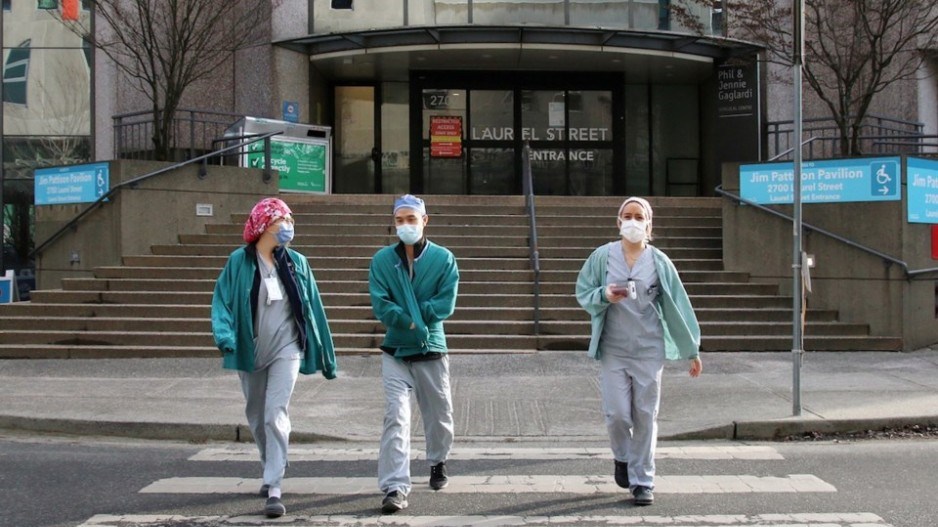Premier David Eby is decidedly unimpressed with Ottawa’s suggestion he use a new revenue stream — from a tax he didn’t ask the federal government to increase — to give provincial doctors a raise.
The unsolicited idea was floated by federal Finance Minister Chrystia Freeland recently, in response to complaints from doctors to her decision to increase the capital gains tax.
Eby gave an unenthusiastic and frustrated-sounding laugh when asked Tuesday about Freeland fobbing off her tax backlash onto premiers.
“One of the big challenges I think we've had is getting the federal government to understand the depth of the challenge that we face here in British Columbia, and getting their attention and their support on key areas of growth and pressure in our province,” he said.
“One of those areas is the health-care system, without question.”
The federal Liberals raised the inclusion rate (the percentage of capital gains that are taxable) from one-half to two-thirds on capital gains above $250,000.
Among the many groups that say they will be negatively impacted by the change are doctors, who frequently incorporate their medical practices, and also use those corporations for retirement investments.
Prime Minister Justin Trudeau has been unsympathetic, saying the wealthiest should have to pay more to fund critical services.
Freeland took it a step further, pointing to $19.4 billion in new revenue the increase will provide Ottawa, as well as an additional $11.6 billion for the provinces. B.C.’s share, proportionally, would be in the neighbourhood of $500 million annually, though it would depend on a whole host of variables in future years.
“That’s a lot of additional money for provinces and territories,” said Freeland.
“I would invite Canadians who feel that our doctors should be paid more to suggest that provinces and territories should be using some of that revenue to increase the actual salaries, the rate of compensation of doctors.”
Freeland either didn’t know or didn’t care that B.C. in 2023 spent considerable time overhauling the family doctor payment model, giving more security, more provincial support and in some cases massive pay increases to family doctors under the new fee model.
“We have taken action to address salary differentials for family doctors,” said Eby.
Health-care spending has increased almost 72 per cent since the NDP took power in 2017, and is budgeted to reach almost $36 billion this year. It’s the single-most expensive government program, accounting for 40 per cent of all annual provincial spending.
The problem, said Eby, is that federal health funding — making up less than one-third of B.C.’s total cost — is failing to keep up with “massive growth in the system,” said Eby.
That’s despite premiers in 2022 eking out a new cash infusion from Ottawa.
“That is a challenge for us financially and we need a strong federal partner on the sustainability of our health-care system going forward,” said Eby.
Doctors say they should be exempt in some manner from the federal changes.
“The proposed increase to the capital gains inclusion rate adds yet another burden to doctors during a time when our health system and the providers within it are already under constant strain,” said Doctors of BC.
“Our concern is this change could dissuade doctors from opening or keeping their practices as a corporation, which in turn could impact patient care.”
It’s the exact wrong message to send at a time when B.C. is dealing with numerous emergency room closures caused, in part, by a lack of doctors.
And the question to the premier on Ottawa’s tax change came at an event intended to highlight a new medical school at Simon Fraser University’s Surrey campus, which will produce much-needed graduates by 2029.
Eby said he intends to raise the issue this weekend at the Council of the Federation meeting of premiers in Halifax.
Not that it’s expected to do much good. Ottawa already heard the complaints from doctors, and went ahead with the increase anyway. Any fallout will be British Columbia’s to address. Add it to the growing list of complex, serious health-care problems the current and future B.C. governments will have to fix.
Rob Shaw has spent more than 16 years covering B.C. politics, now reporting for CHEK News and writing for Glacier Media. He is the co-author of the national bestselling book A Matter of Confidence, host of the weekly podcast Political Capital, and a regular guest on CBC Radio.




